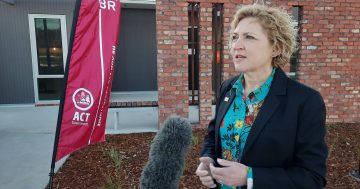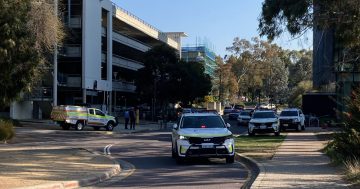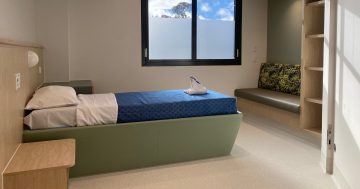
The Christmas period can be a tough time for people with eating disorders. Photo: Michelle Kroll.
The summer holiday season is often a time of celebration with family and friends, but for people with an eating disorder, the prospect of gathering around a table full of food can be incredibly stressful.
There are gaps in eating disorder services in the ACT. Supporting a person with an eating disorder requires a range of different skills and services due to the complexity of a mental health condition that requires a spectrum of support for psychological, medical and sociocultural needs.
People with eating disorders have been clear that the shame and stigma around this mental health condition make it hard to talk about.
There has been strong community engagement and conversation about increasing eating disorder support services – and a special mention to the many advocates over the years who have committed the ACT Government to do better for our community.
Progress has been made on the Expanding Public Health Services for Eating Disorders in the Territory Project to provide a greater range of services. The ACT Health Directorate worked with clinicians from Canberra Health Services and Calvary Public Hospital Bruce, peak NGO representatives, people with lived experience and academics to design models of care for public eating disorder services.
That’s developed a shared understanding of better supporting people with eating disorders, their families and carers through early intervention, day programs, clinical inpatient care in hospital, residential programs, and family and carer support.
An Eating Disorders Clinical Hub bringing all these services together is expected to be fully operational in January. The Clinical Hub has already reduced waiting lists for the Eating Disorder Program through the Short Term Recovery Intervention for Disordered Eating (STRIDE) and parenting groups.
STRIDE provides short-term therapy to people currently waiting to access the longer-term Eating Disorder Program and expands opportunities for student psychologist placements.
Parenting groups support parents and carers of a person under 18 with an eating disorder. This includes encouraging and engaging someone in treatment, which may be painful or traumatic but necessary for long-term recovery.
The role of family and carers is critical in supporting a person’s treatment and recovery for any mental health condition. Family and friends can help us maintain healthy habits, keep a positive state of mind, and get back on track when unhelpful thoughts take over.
The Clinical Hub dietitian provides nutritional assessments to clients in the eating disorder program, and an in-reach clinician is being recruited. Funding was also granted to Eating Disorder Families Australia to help more families build the skills and knowledge to better support loved ones.
There is still more to come. The community-based Early Intervention Service for Eating Disorders will commence mid-2022, and the tender for the concept design for the Residential Treatment Centre opened on 17 November. Experts in the eating disorder sector, including people with lived experience, policy and clinical experts will be part of the residential centre co-design processes.
This is a first of its kind service in the ACT – broadening our system to better support a person’s needs and their family with an eating disorder.
Through this work, a lot has been added to the service landscape in accordance with the models of care that were co-designed with clinical experts, the community and people with lived experience.
These are public health services so everyone can access support, ensuring no one falls through the gaps. Some people with an eating disorder cannot easily access private health care, don’t have a regular GP or an easy way to navigate mental health services.
With the establishment of a Clinical Hub, and the provision of public health services – both community and residential settings – across the full spectrum of need, we will be able to support more people than ever before in the ACT. Importantly, this support is not contingent on someone’s ability to pay.
The long-term impacts of earlier access to treatment and support for families will be felt across our community, as people can fully participate in education, employment, community activity and healthier social relationships.
The ACT Government’s ongoing work with clinical experts, community sector partners, and people with lived experience in designing models of care and physical spaces is key to the success of our eating disorder programs.
Shane Rattenbury made good progress with the ACT Eating Disorders Position Statement in 2018. I look forward to delivering on services that meet this statement to ensure everyone can access support specific to their needs.
Through co-design with experts in public health care, non-government organisations, advocates, policy experts within ACT Health and Canberra Health Services, and people who know how it feels to live with an eating disorder, we can truly create a better future for all.
Emma Davidson is the Greens MLA for Murrumbidgee and Minister for Mental Health.




















